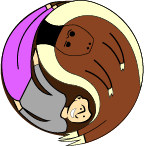The short of it:
Weapons are tool of necessity, not tools of good government.

30. Diminishing War.
[Those] who in the use of Tau [render] assistance to a human ruler, [do] not use weapons to force the people. [Their] actions are such as [they] may well accept the results of (or, such as [they] would wish rendered to [themselves] again).
Where legions are quartered, briars and thorns grow. In the track of great armies, there must follow bad years.
The good soldier is brave in need only (to effect some good purpose). [They venture] nothing for the sake of power. [They are] brave in need, but not a bully. [They are] brave in need, but [are] not over-bearing. [They are] brave in need, but [they] cannot be less. [They are] brave in need, but not violent.
When things reach their highest pitch of vigour, they become old. This is called not Tau. What is not Tau is soon at an end.
30. ‘A Caveat Against War.’
30.1 [Those] who would assist a [ruler] of [people] in harmony with the Tao will not assert [their] mastery in the kingdom by force of arms. Such a course is sure to meet with its proper return.
30.2 Wherever a host is stationed, briars and thorns spring up. In the sequence of great armies there are sure to be bad years.
30.3 A skilful (commander) strikes a decisive blow, and stops. [They do] not dare (by continuing [their] operations) to assert and complete [their] mastery. [They] will strike the blow, but will be on [their] guard against being vain or boastful or arrogant in consequence of it. [They strike] it as a matter of necessity; [they strike] it, but not from a wish for mastery.
30.4 When things have attained their strong maturity they become old. This may be said to be not in accordance with the Tao: and what is not in accordance with it soon comes to an end.
30. Be Chary* of War.
30.1 [Those] who with Reason [assist] the master of [humanity] will not with arms strengthen the empire. [Their] methods invite requital.
30.2 Where armies are quartered briars and thorns grow. Great wars unfailingly are followed by famines. A good [person] acts resolutely and then stops. [They venture] not to take by force.
30.3 Be resolute but not boastful; resolute but not haughty; resolute but not arrogant; resolute because you cannot avoid it; resolute but not violent.
30.4 Things thrive and then grow old. This is called un-Reason. Un-Reason soon ceases.
*Suspiciously Reluctant.

The long of it:
Chapter 30 harkens back to Chapter 23 (the means define the ends). However, this time Lao Tsu specifies what the poor means are, weapons. And keep in mind, the Chinese wouldn’t invent gunpowder for another thousand years after Lao Tsu wrote this.
However, they did have the draft. That’s what warring states used the peasantry for back then1. Lao Tsu says picking up weapons for questionable causes only results in other people picking up weapons in defense. “‘Backfire’ captures the meaning here, but would be anachronistic” (Ames 212). R.J. Lynn agrees: “‘those that live by the sword, die by the sword’” (Wang 107).
However, Lao Tsu isn’t telling us to throw down our weapons and throw up our hands. He’s telling us not to give away our agency to institutions devoted to killing people (“assistance to a human ruler” -Chalmers). The decision to kill or die should be ours alone, not the governments (“The good soldier is brave in need only.” -Chalmers).
People don’t need an incentive to defend their homes, but the decision to pick up a weapon needs to be a personal one. Killing or dying is too important to leave up to a headless bureaucracy, run by people who aren’t putting their lives at risk.
Institutionalized violence is a recurring theme in the Tao Te Ching, most prominently in Chapters 73 through 76 (the Death Chapters).
-TB
works cited
1“Warring States Period.” Wikipedia, Jan 18, 2022. https://en.wikipedia.org/wiki/Warring_States_period.
